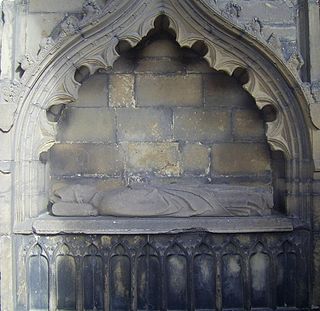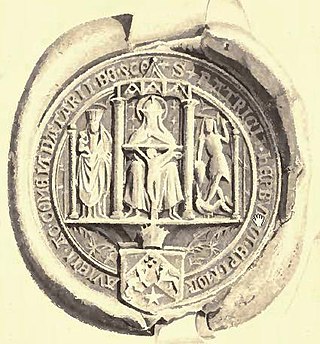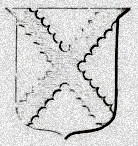Related Research Articles
The Abbot of Tongland was the head of the Premonstratensian monastic community of Tongland Abbey in the historical county of Kirkcudbrightshire in Dumfries and Galloway. The following is a list of abbots and commendators:
Robert Crichton was a 16th-century Scottish Catholic cleric.
Peter Rollock or Rollo of Pilton was a Scottish judge and Bishop of the Church of Scotland.

John de Winchester was a 15th-century English cleric who distinguished himself as an administrator and bishop in Scotland. Winchester was a student of canon law from 1418, graduating with a bachelorate in 1421.

Patrick Hepburn was a 16th-century Scottish prelate. He served as both pre- and post-Reformation Bishop of Moray.
John Durie (1537–1600) was one of the first Presbyterian ministers in Edinburgh after the Reformation in Scotland.
John Woodman [Wodman] was a 15th-century churchman based in the Kingdom of Scotland. Woodman was a canon of the diocese of St Andrews, and as such was locally made Prior of Pittenweem on the death of the previous prior, James Kennedy, Bishop of St Andrews; however, he was opposed by one Walter Monypenny, while the new bishop, Patrick Graham, desired the position for himself. Woodman had lost litigation for this post to Monypenny by 17 September 1466, and possession to the bishop, though Woodman was still claiming this priory as late as 1477 when he became Bishop of Ross.
Alexander de Kylwos – written alternatively as Frylquhous, Kylquos, and a variety of other forms – was a Scottish churchman and prelate active in the second half of the 14th century. He is known to have held senior positions in three bishoprics, and senior offices in two, before being elected and appointed Bishop of Ross in 1371. Though his episcopate is relatively obscure, he seems to have spent almost all of it inside or around his province, was closely associated with William III and Euphemia I, successive rulers of Ross, and was an associate of the famous Alexander Bur, Bishop of Moray, during the latter's struggle with Alexander Stewart, the son of the King later known by the nickname "Wolf of Badenoch".

Nicholas de Balmyle, also called Nicholas of St Andrews, was a Scottish administrator and prelate in the late 13th century and early 14th century. A graduate of an unknown university, he served his earliest years as a clergyman at St Andrews, moving on to hold churches in Lothian as well as deputising to two archdeacons of Lothian.
Walter Stewart was a 15th-century churchman in the Kingdom of Scotland. He was a cousin of King James II of Scotland, being like King James a grandson to King Robert III of Scotland.
William O. Tiron. was a late 13th-century Tironensian abbot and bishop in the Kingdom of Scotland. He appears in the extant sources for the first time on 25 April 1276; he is Abbot of Arbroath. According to the Scotichronicon, the work of the 15th-century historian Walter Bower, William's predecessor Adam de Inverlunan had died in 1275, so William probably became abbot in either that year or in 1276.

James Chisholm, Bishop of Dunblane, was the eldest son of Edmund Chisholm, the first Chisholm to own the estate of Cromlix in Dunblane parish, Strathearn, having moved from the Scottish Borders. In his early years as a clergyman, he was a chaplain to King James III of Scotland; the king apparently sent him to Rome for some time.
George Graeme (1565–1643), Bishop of Dunblane and Bishop of Orkney, was a late sixteenth- and early seventeenth century Church of Scotland prelate.
John Porterfield was a Scottish prelate in the sixteenth-century. A mysterious figure, he emerges in 1571 as the successor to James Beaton II as Archbishop of Glasgow. He was described by Robert Keith as "a kind of titular bishop", propped up by the establishment for nominal purposes during a period of disorder. Porterfield probably held on to the archbishopric into 1572, but he disappeared from the records thereafter. In late 1573, James Boyd of Trochrig became new Archbishop of Glasgow. Porterfield is possibly the John Porterfield, minister of Ayr, who died in 1604 to be succeeded by John Welsh.
Alasdair Caimbeul or Alexander Campbell of Carco was a Scottish noble and prelate. Coming from a branch of Clan Campbell in the allegiance of the Earl of Argyll, his career began in the 1560s still only a minor, serving the Earl of Argyll's interest. He was made Bishop of Brechin, and almost immediately alienated the majority of the bishopric's historical resources into the hands of the earl.
David Lindsay was a Church of Scotland minister and prelate active in the seventeenth-century.
The Archdeacon of Brechin was the only archdeacon in the diocese of Brechin, acting as a subordinate of the Bishop of Brechin. The archdeacon held the parish church of Strachan as a prebend from at least 1274.
George Shoreswood or Schoriswood, was a prelate active in the Kingdom of Scotland during the 15th century. He appears to have been of English-speaking origin, from the family of Bedshiel in Berwickshire.

George Wishart (1599–1671) was a Scottish Episcopalian bishop and author.
William Erskine was a prominent Scottish clergyman in post-Reformation Scotland who served as Protestant Archbishop of Glasgow from 1585 to 1587.
References
- ↑ Fasti Ecclesiae Scoticanae; vol. 7; by Hew Scott
- Keith, Robert, An Historical Catalogue of the Scottish Bishops: Down to the Year 1688, (London, 1924), p. 181
- Watt, D. E. R.; Murray, A. L., eds. (2003), Fasti Ecclesiae Scotinanae Medii Aevi ad annum 1638, The Scottish Record Society, New Series, Volume 25 (Revised ed.), Edinburgh: The Scottish Record Society, ISBN 0-902054-19-8, ISSN 0143-9448